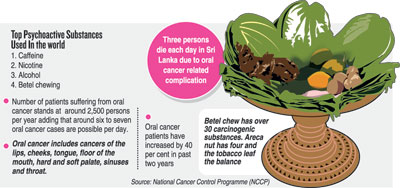News
Oral cancer killing more
 A sharp rise in oral cancer, and more cases among younger people, has prompted health authorities to reiterate warnings on betel chewing and smoking, which is directly linked to the spread of oral cancer.
A sharp rise in oral cancer, and more cases among younger people, has prompted health authorities to reiterate warnings on betel chewing and smoking, which is directly linked to the spread of oral cancer.
Betel is globally the fourth most common psychoactive substance consumed, after caffeine, nicotine and alcohol.
Oral cancer includes cancers of the lips, cheeks, tongue, floor of the mouth, hard and soft palate, sinuses and throat.
Three persons die each day in Sri Lanka due to oral cancer-related complications, Consultant in Community Dentistry in National Cancer Control Programme (NCCP) Dr. Prasanna Jayasekera said.
He said oral cancer could be prevented by early detection and treatment.
The Health Ministry says there are around 2,500 cases of oral cancer each year – about six to seven every day.
Health authorities are now carrying out awareness-raising programs among high-risk groups – bus drivers, three-wheeler drivers, estate workers and construction workers.
A survey conducted by the Institute of Oral Health (IOH) on 200 bus drivers and conductors revealed that more than 80 per cent of them chew betel to keep themselves awake and focus on the job. Under the Tobacco and Alcohol Act of 2006 it is an offence to drive under the influence of drugs.
Nearly 60 per cent of betel chewers in the survey had minimal knowledge of the harmful effects of betel and the rest were unaware of available treatment.
“Oral cancer patients have increased by 40 per cent in the past two years. Betel chew has more than 30 carcinogenic substances, with arecanut in the chewing mix having four and tobacco leaf the balance,” Dr. Jayasekera said.
According to a national survey by the Ministry of Health in 2002, oral cancer in the general population is around 3.4 per cent.
The two-month IOH survey showed betel chewers had abnormalities in their oral mucosa (lining of the mouth) due to the habit. This included oral sub mucous fibrosis (a chronic disease marked by rigidity and an eventual inability to open the mouth), frictional keratosis (a white patch in the mouth) and lichen planus (inflammation causing bumps and sores).
One of 10 bus drivers and conductors surveyed by the IOH were prone to oral cancer due to prolonged chewing, IOH Head in Research, Dr. Hemantha Amarasinghe said.
Oral cancer has a 50 per cent mortality rate and patients in advanced stages die within five years. There is a pre-malignant stage, as oral lesions, and if diagnosed early in this stage the disease can be successfully treated.
“Now we have started a massive campaign for a risk factor model with television commercials and paper advertisements, where people can calculate how much they are at risk of getting oral cancer. For example, if you chew three betel leaves per day you are in the ‘high risk’ category for getting oral cancer,” Dr. Amarasinghe said.
A decade ago, he said, doctors only witnessed patients above 40 years of age suffering from oral cancer. But today, 10 per cent of the patients belong to the age group of 20 to 30 years, while 30 per cent come from the 30 to 40-year age group – an alarming trend.
“Out of the one-third of preventable cancers, about half are preventable by not smoking,” Dr. Amarasinghe said.
“Smoking has become more and more prevalent among the youth, who consume tobacco as a style statement or due to stress or peer pressure. Consumption of tobacco is an emerging social and public health problem and there is a need to sensitise the masses towards its ill-effects,” he said.
There has, however, been little benefit from awareness programs carried out jointly by the Health Ministry’s National Cancer Control Programme and the National Transport Commission since 2012.
“Around 35,000 stickers printed in Sinhala and Tamil were posted in buses and other public places calling on the public to stop smoking and desist from chewing betel quid, beeda and babul,” Dr. Amarasinghe said.
Early detection followed by treatment was of critical importance in increasing the survival rate and improving quality of life. Hence, annual screening for oral cancer is important. Most oral cancers can be diagnosed from lesions in the mouth, Dr. Amarasinghe said.

